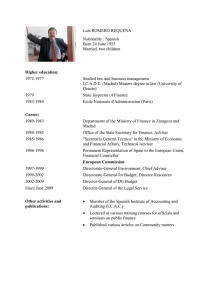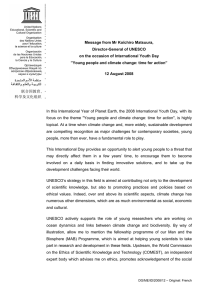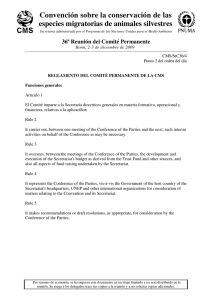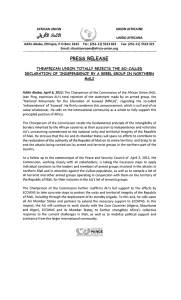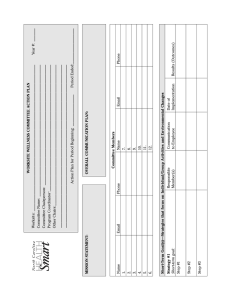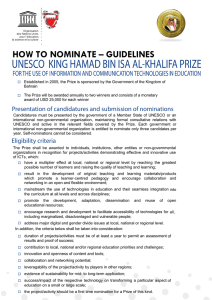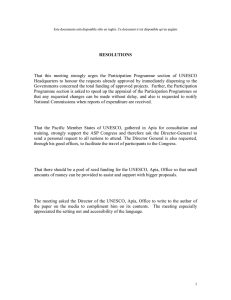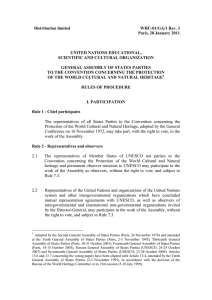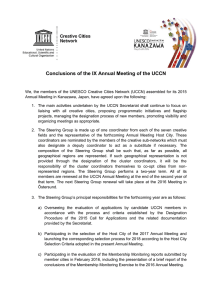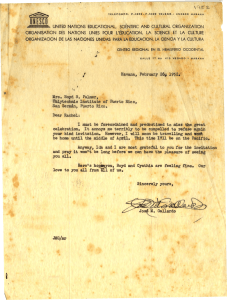Methods of work of the Executive Board - unesdoc
Anuncio
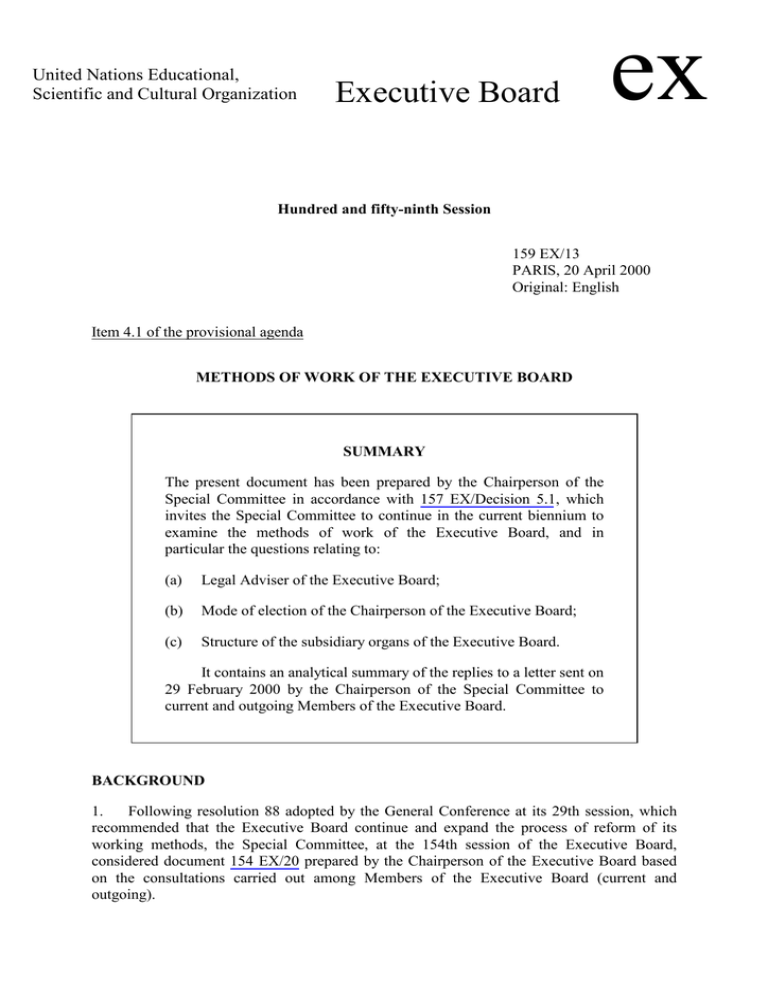
United Nations Educational, Scientific and Cultural Organization Executive Board ex Hundred and fifty-ninth Session 159 EX/13 PARIS, 20 April 2000 Original: English Item 4.1 of the provisional agenda METHODS OF WORK OF THE EXECUTIVE BOARD SUMMARY The present document has been prepared by the Chairperson of the Special Committee in accordance with 157 EX/Decision 5.1, which invites the Special Committee to continue in the current biennium to examine the methods of work of the Executive Board, and in particular the questions relating to: (a) Legal Adviser of the Executive Board; (b) Mode of election of the Chairperson of the Executive Board; (c) Structure of the subsidiary organs of the Executive Board. It contains an analytical summary of the replies to a letter sent on 29 February 2000 by the Chairperson of the Special Committee to current and outgoing Members of the Executive Board. BACKGROUND 1. Following resolution 88 adopted by the General Conference at its 29th session, which recommended that the Executive Board continue and expand the process of reform of its working methods, the Special Committee, at the 154th session of the Executive Board, considered document 154 EX/20 prepared by the Chairperson of the Executive Board based on the consultations carried out among Members of the Executive Board (current and outgoing). 159 EX/13 - page 2 2. Having considered documents 154 EX/20 and 154 EX/49 the Executive Board, in 154 EX/Decision 5.2, requested the Special Committee “to undertake an in-depth study on the methods of work of the Executive Board” and invited it “in accordance with 29 C/Resolution 88, to call upon experts from Member States non-Members of the Executive Board”. In pursuance of that decision, the Special Committee met from 9 to 11 September 1998 in order to continue its examination of the methods of work of the Executive Board and to submit recommendations thereon to the Executive Board at its 155th session. The Special Committee, with the assistance of the Chairperson of the Board, called upon six experts from Member States non-Members of the Board to participate in the work of the Board on this question. Mr Torben Krogh (Denmark), Mr Vojciech Falkowski (Poland), Ms Sybil Campbell (Jamaica), Mr Khamliene Nhouyvanisvong (Lao People’s Democratic Republic), Mr Yemi Lijadu (Nigeria) and Mr Musa Bin Jaafar Bin Hassan (Oman). 3. The Executive Board at its 155th session, having examined document 155 EX/20 (Recommendations of the Special Committee on the methods of work of the Executive Board) adopted 155 EX/Decision 5.4, inviting “the Special Committee to undertake an in-depth study on the nature of the work which can be carried out between sessions of the Executive Board, and on the mechanism which can be established to carry out this function, and to report to it thereon at its 156th session” and requesting “the Special Committee to continue its examination of ethical issues at the Board’s 156th session with a view to submitting options to it, in particular regarding appointments to the Secretariat”. 4. With a view to the implementation of that decision, the Chairperson of the Special Committee attempted to consult members of the Committee on the above-mentioned two questions. In the absence of replies, the summary records of the plenary meetings of the 155th session served as basis for the Special Committee’s debate at its 156th session. When considering this matter at the 156th session, the Committee drew up an order of priority for the examination of questions remaining to be studied (156 EX/19) and decided that the examination of those questions would require preparatory work which the Committee could carry out in various ways: consultations with Member States, establishment of working groups and appointment of rapporteurs. The Executive Board, in 156 EX/Decision 5.4, requested the Special Committee to continue examination of the questions related to the methods of work of the Executive Board, including those that had not yet been reviewed. 5. On the basis of document 157 EX/SP/INF.2, the Executive Board at its 157th session adopted 157 EX/Decision 5.1, which invited the Special Committee to continue, in the current biennium, to examine the methods of work of the Executive Board, in particular the following questions which should be examined as a matter of priority: Ø Ø Ø Legal Adviser of the Executive Board; Mode of election of the Chairperson of the Executive Board; Structure of the subsidiary organs of the Executive Board. 6. Furthermore, the Executive Board invited the Special Committee to undertake an indepth study on the establishment of an audit committee within the Executive Board, in line with 156 EX/Decision 5.5 (D). 7. In pursuance to that decision, the Chairperson of the Special Committee sent a letter dated 29 February 2000 to the representatives of the States Members of the Executive Board, seeking their views and suggestions on the above-mentioned matters, with a view to facilitating the deliberations thereon within the Special Committee. In the light of the terms of 159 EX/13 - page 3 reference of the Special Committee (158 EX/Decision 6.1) which, inter alia, entrust the Committee with the task of consideration of in-depth studies on topics selected by the Executive Board, the Chairperson also invited proposals on any relevant issues which the Special Committee could examine in the course of the biennium. Another letter was sent on the same day to outgoing Members of the Board to obtain the benefit of their experience and to invite any suggestions they might have on the working methods of the Executive Board. 8. Seventeen replies were received: ♦ seven from the Europe region, including a reply from Mr P. Pataki, former Chairperson of the Executive Board (Hungary); ♦ three from the Latin America and the Caribbean region, including a reply from Ms S. Mendieta de Badaroux, Chairperson of the Executive Board (Honduras); ♦ two from the Asia and the Pacific region; ♦ four from the Africa region, including a reply from Mr S.O. Wandiga, former Chairperson of the PX Commission (Kenya); ♦ one from the G77 Group. 9. These replies provide a number of broad guidelines along which the debate could be organized and developed. ANALYTICAL SUMMARY OF REPLIES 10. The Special Committee should as a rule receive substantive justification when it is requested to address a particular issue. Such justification must include the background to the issue and highlight the problem that needs to be solved. A. Legal Adviser of the Executive Board 11. An objective examination of the specific circumstances that led to the questioning of the efficiency of the present nature of the post of the Legal Adviser needs to be made in order to establish what is truly at stake and hence what kind of remedy should be sought. If it turns out that the perceived weakness was due to particular, but transient, circumstances, then the review should be focused on finding ways to avoid the recurrence of such circumstances in the future. If, however, the weakness is indeed endemic in the constitution of the post of Legal Adviser, then a solution will have to be found. 12. There appears to be an emerging consensus with regard to the question of the appointment of an independent Legal Adviser of the Executive Board. In the view of the majority, there is no need for the Executive Board to have its own Legal Adviser distinct from that of the Organization, as it would involve duplication of efforts, give rise to additional costs for the Organization and lower the status of the official concerned. 13. The amendment to the Rules of the Procedure of the General Conference (30 C/Resolution 78), under which the Legal Committee of the General Conference may now be consulted at any time, would appear to be sufficient for the solution of any problems that may arise during the current biennium and could, if necessary, be re-examined before the 159 EX/13 - page 4 31st session of the General Conference. In the meantime, the Special Committee should reflect on the practical implementation of consultations between the Executive Board and the Legal Committee. The opinion is expressed that the Legal Committee cannot, for practical and financial reasons, replace the Legal Adviser, and therefore an attempt should be made to better ensure the impartiality of the Organization’s Legal Adviser. It is proposed that the terms of service, responsibilities and duties of the Legal Adviser be re-evaluated and that the appointment and tenure of such an officer be determined by consultation between the Director-General and the two UNESCO governing bodies. 14. A comparative study on the current practice within the United Nations system with regard to the Legal Adviser mechanisms and best practices should be undertaken. [The Secretariat will provide the Special Committee with such information to facilitate discussion of this item.] 15. Two replies maintain the need for an independent legal adviser to the Executive Board in order to allow the Executive Board to have two interpretations of texts and rules. REQUEST TO THE SPECIAL COMMITTEE The Special Committee is hereby requested CONCLUSIVELY to discuss the following matters for recommendation to the Executive Board at its 159th session: (a) one Legal Adviser providing independent legal advice to both the Director-General and the Executive Board; (b) modalities for the implementation of 30 C/Resolution 78. B. Mode of election of the Chairperson of the Executive Board 16. Several Executive Board Members consider that the current procedure of electing the Chairperson of the Executive Board does not require consideration by the Special Committee. It is recalled that the proposal to transfer to the Special Committee the task of interviewing and shortlisting candidates for the position of Executive Board Chairperson was deemed impractical. Nevertheless, one Member renews the proposal to entrust the Special Committee with such a responsibility. 17. On the other hand, it is also proposed that the Special Committee should evaluate the functioning and adequacy of the present arrangements and reflect on the manners in which the method of election could be further improved without unduly politicizing it and rendering the process institutionalized, with full respect for democratic principles, fairness and serenity. 18. Several concrete amendments/proposals are suggested as follows: (a) establishment of official procedure for submission of candidatures for this post; (b) introduction of a procedure by which, in order to stand for election to the office of Chairperson, candidates shall have participated in at least two full sessions of the Executive Board; 159 EX/13 - page 5 (c) submission of the candidature by a letter addressed to the President of the General Conference; (d) introduction of a rule by which Board Members may request the resignation of the Chairperson and propose the name of a representative of another Member State to replace him/her; such a motion (limited to one per session) shall be put to the vote by secret ballot within 24 hours and shall require a majority of the votes of all Members of the Board; (e) need for continuity of representation of Member States of the Executive Board to allow better knowledge of the capacities of potential candidates; (f) interviews of candidates (regionally and ultimately by the Board); (g) amendment of Rule 15 of the Rules of Procedure of the Executive Board to have an interim Chairperson elected from among the six Vice-Chairpersons, instead of the current rotating basis; (h) establishment of clear rules for the replacement of a Chairperson who is a candidate for the post of the Director-General, by deciding that in such a case the Chairperson shall resign at the spring session preceding the autumn session at which the elections of the Director-General take place; the new Chairperson to be elected at that spring session. 19. A suggestion is put forward to the effect that the new mode of election of the Chairperson be established on the basis of a rotation system among geographical groups in UNESCO, with two alternatives: (a) each group in turn would present a candidate for the approval of the Board, or (b) the Board would be free to elect the Chairperson from among any of the representatives from the geographical group identified through the rotation system. REQUEST TO THE SPECIAL COMMITTEE The Special Committee is hereby requested to debate the following matters for recommendation to the Executive Board at its 159th session: (a) mode of election of the Chairperson of the Executive Board; (b) mode of election of the interim Chairperson of the Executive Board; (c) introduction of a rule governing the situation in which a serving Chairperson of the Executive Board becomes a candidate for the post of Director-General of UNESCO. C. Structure of the subsidiary organs of the Executive Board 20. There is common agreement that the functioning and tasks of the present organs should be reviewed and evaluated with a view to defining and streamlining the structure. Some are in favour of a reduction in the number of subsidiary bodies, whereas others put emphasis on a better distribution of tasks. Account should be taken of the introduction of the results-based approach requiring the programme and budget allocation to be considered together, and of the 159 EX/13 - page 6 desirability of bringing together the Board’s responsibilities for the various oversight mechanisms and adopting a coherent approach to the “visibility” of UNESCO. 21. Many views are expressed with regard to the NGO Committee, the need for its revitalization, and in support of the expansion of its terms of reference through either (a) transfer of responsibility for external relations issues from the PX Commission, thereby transforming the NGO Committee into a Committee for Cooperation, or (b) establishment of a Civil Society and Media Committee dealing with National Commissions, NGOs, publications and the media. 22. There is also a view that, notwithstanding the importance of UNESCO’s relations with civil society, the frequency of meetings of the NGO Committee could be reduced to twice per biennium or else that its tasks could be transferred to either the Programme Commission or the Special Committee. 23. With regard to the PX and FA Commissions, a point is made that the existing practice of limiting the reopening of issues in plenary to exceptional cases should be reinforced in order to avoid duplication of work. Plenary should be allowed to concentrate on its main responsibility, i.e. policy and guidance issues. 24. A proposal is made to redefine the mandates of the two plenary commissions, thereby setting up a Programme and Budget Commission entrusted with responsibility for making recommendations to the General Conference on the biennial programme, budget allocation and monitoring of the implementation of the C/5 document, and a Finance and Administration Commission dealing with the recommendations on budget ceiling and all administrative, managerial issues including matters of extrabudgetary funding and decentralization. 25. Views are divided on the utility of holding joint meetings of the PX and FA Commissions. 26. The replies do not support the proposed establishment of a group of experts for the Programme Commission (analogous to FA), arguing that the diversity of UNESCO’s programmes rules out the appointment of permanent experts, which would put the developing countries at a disadvantage, and that the holding of its meetings prior to PX might render the Commission superfluous vis-à-vis the plenary. 27. A request is put forward for the Special Committee to elaborate, as a priority issue, on the proposal made at the 157th session of the Executive Board (157 EX/PLEN/DR.3) to include the Group of Experts on Financial and Administrative Matters among permanent subsidiary organs of the Executive Board. 28. There seems to be general agreement on maintaining the current mandate of the Committee on Conventions and Recommendations (CR). 29. A view is expressed to the effect that the Special Committee should continue with its current responsibilities (with the exception of those regarding JIU relations), with particular emphasis on governance issues. 30. There is widely shared support for the in-depth study on the proposal to establish an Audit Committee which could deal with oversight mechanisms, including external and internal audit, evaluation and JIU relations and reports. In that regard, a comparative study of relevant current practices in other governing bodies of the United Nations system 159 EX/13 - page 7 organizations should be undertaken. [The Secretariat will provide the Special Committee with such information to facilitate discussion of this item.] 31. In addition to the standing subsidiary organs, the Executive Board could have recourse to ad hoc, open arrangements to be set up for a specific purpose. 32. A suggestion is made that the drafting group responsible for the preparation of the C/6 document (Recommendations of the Executive Board on the Programme and Budget (C/5)) be convened well in advance of the session at which the Executive Board is to examine and adopt it. 33. A number of general remarks are made in the context of methods of work of the Executive Board: (a) the need to streamline the decision-making process of the Executive Board with emphasis on how to avoid carrying over topics from one session to the next; (b) a request for an external audit of the various financial agreements between UNESCO and NGOs since the implementation of the 1994 Directives; (c) a proposal that in future the elected Member States should appoint their Permanent Delegates to UNESCO as their representatives on the Board; (d) the preservation of the intellectual role of the Executive Board; (e) a proposal that, at each session of the General Conference, Member States should be invited to discuss a fixed and limited number of questions that will help to structure the statements of the heads of delegation; (f) a request for the Executive Board to fulfil more effectively its role of monitoring the implementation of the Programme and Budget and relevant General Conference resolutions. REQUEST TO THE SPECIAL COMMITTEE The Special Committee is hereby requested to debate the following matters for recommendation to the Executive Board at its 159th session: (a) streamlining the functions of the subsidiary organs of the Executive Board in order to maximize effectiveness and efficiency; (b) establishment of an Audit Committee as a permanent subsidiary organ of the Executive Board; (c) inclusion of the Group of Experts on Financial and Administrative Matters among permanent subsidiary organs of the Executive Board. 159 EX/13 - page 8 D. Proposed topics for consideration by the Special Committee 34. The replies reflect Member States’ agreement with the renewal of the Special Committee’s terms of reference concerning consideration of in-depth studies. To that effect, a proposal is made that the possibility be explored of designating teams of two or three members of the Special Committee to undertake such studies, with the support of the Secretariat. Emphasis is placed on the specific analytical character of the Committee, which should play the role of the “think tank” of the Board. 35. In addition to the above-mentioned wide support for the in-depth study on the establishment of the Audit Committee, the following suggestions are made regarding the possible themes for studies in depth that could be carried out by the Special Committee: (a) the following issues which were identified by 157 EX/Decision 5.1 namely: the size of the Executive Board, mode of election and rotation of its Members and frequency of its sessions; (b) UNESCO’s role in the field of communication; (c) evaluation and assessment of the current functioning of the General Conference, especially in the light of the implementation of 29 C/Resolution 87; (d) amendment to Article VI, paragraph 2, relating to the term of office of the Director-General, in the light of 30 C/Resolution 77 deciding to refer this matter back to the Executive Board for resubmission to the General Conference at its 31st session; (e) the impact of globalization on UNESCO’s areas of interest: education, science and technology, free flow of information, cultural preservation and cooperation for peace. REQUEST TO THE SPECIAL COMMITTEE 1. The Special Committee is hereby requested to evaluate the topics proposed for in-depth study and to prioritize them for future consideration. 2. The Special Committee is further requested to consider what is meant by “in-depth” studies and the manner in which the Committee has conducted such studies in the past.
